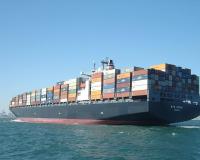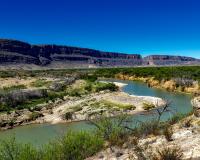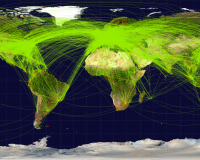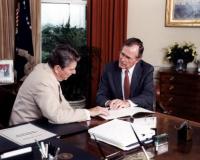
Vibrant Environment
Governance And Rule Of Law
All | Biodiversity | Climate Change and Sustainability | Environmental Justice | Governance and Rule of Law | Land Use and Natural Resources | Oceans and Coasts | Pollution Control

Although making no specific commitments, the Trump Administration continues to propose the potential renegotiation of NAFTA. House Democrats, in a Resolution earlier this spring, and a group of 15 environment, labor, and human rights groups, in an Eight-Point Plan, have called for a renegotiation of NAFTA that ensures that regulations protecting the environment are maintained.
In an earlier blog post, I discussed how environmental protection provisions incorporated in trade agreements could help mitigate the adverse environmental impacts of (international) trade. This post explores the inverse topic: how the investment chapters in NAFTA (and other trade agreements) may affect environmental and social protections in parties’ domestic regulation.

Since the early 2000s, many Chinese schools and kindergartens have built synthetic running tracks on their campuses. However, many of these schools and kindergartens are underfunded and consequently tend to award contracts to the lowest bidders, often at a cost to the environment and human health.

Imagine the dumpsters behind restaurant row in your community signaling their hauling company to come pick them up because they are full and about to overflow, or their food is rotting and about to stink up the neighborhood. Such are the promises for waste management of new “smart technologies,” based on sensors, radio frequency identification (RFID) tags, big data, and social networks.

In a series of executive orders, the president has requested that agencies review several environmental protection rules, and if deemed necessary, repeal or modify rules to better facilitate economic growth. One such rule, the Clean Water rule, also known as the Waters of the U.S. rule (WOTUS), has been in the crosshairs of industry for some time.

Often lost in discussions of efficacy and payment relating to the proposed U.S.-Mexico border wall is what would happen to the environment if a concrete divider were placed across a nearly-2,000 mile swath of habitat. While wall-like barriers already stand on hundreds of miles of the U.S.-Mexico border, expanding to a full-border wall would constitute a massive transformation of the rest of the United States’ southern borderlands, posing substantial threats to the wildlife that roam the area.

With the change in the administration there is renewed interest in whistleblower protections by federal employees. Federal employees who are troubled by what is occurring within their agency should take a moment to better understand their rights and consult with lawyers who are knowledgeable about these complex laws before taking action that could result in adverse employment actions. What turns out to be protected or not protected may surprise you. The starting point to understand federal employee whistleblower rights and some things to watch out for are outlined below.

Rising levels of global consumption are having significant impacts on biodiversity worldwide. The world is facing its sixth extinction, a massive loss of biodiversity, with extinctions occurring at 100-1,000 times pre-human levels. International trade increases these threats. A Nature article documenting the impacts of trade in thousands of commodity chains concluded that 30% of threats to threatened and endangered species globally were due to international trade. It found that while wealthy countries drive most consumption, the greatest threats to species are found further down the supply chain, in the developing countries that produce the commodities sought after by the richer nations.

Although it’s been several months since the United Kingdom’s populist vote to leave the European Union, it seems as though the U.K. is trapped in a bit of Euro-divorce limbo. Some have even gone as far as to call it “Schrödinger’s Brexit,” invoking quantum physicist Erwin Schrödinger’s famous thought experiment to explain the government’s policy folly. Like the fate of Schrödinger’s cat, Britain’s future is unclear: Article 50 in the Treaty of Lisbon, which delineates the rules for exiting the European Union, has not yet been triggered. In other words, despite the outcome of the popular referendum, Britain has not yet officially declared whether it is leaving the EU.

Angus Macbeth died in his sleep on January 22. With his passing, the environmental bar lost a founding father, an extraordinary advocate who helped establish the Natural Resources Defense Council, built and led the environmental practice in the U.S. Department of Justice (DOJ), and grounded the environmental practice group at Sidley Austin LLP.
Along with many others, I lost a friend and mentor—a man who shaped our collective approach to the law not through lectures or pronouncements, but by brilliant example, always finding the best analytical path, the right words to sum up the central theme, the most convincing advocacy.

The public debate around President Trump’s environmental nominees follows an old script, playing jobs against the environment. But the script’s not just old, it’s obsolete. Being anti-environment hasn’t been a winning political strategy since at least President Reagan’s first term, in which he famously appointed three people who were hostile to the environmental programs they were named to lead: James Watt as Secretary of Interior, the late Ann Gorsuch as EPA Administrator, and Rita Lavelle as head of the Superfund program. In the name of deregulation, the “gang of three” cut staff, budgets, and agency enforcement actions. Whatever success they enjoyed was short-lived, however, as a strong backlash drove all three from office in 1983.